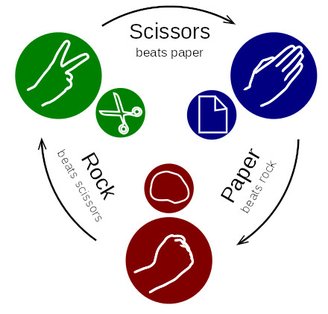You always said
the cards would never do you wrong
The trick, you
said, was never play the game too long
— Still the Same, Bob Seger
###
“You mean there’s a technique?” I asked my buddy. “Sure,” he said, “Why do you think you just paid for my coffee?”
Rock, paper, scissors. RPS. Roshambo. Goes back at least to China’s Han Dynasty, 206 BC – 220 AD. Game of chance. Everyone knows that. No way of swaying the outcome, it’s like tossing a coin (see below). Three fist pumps and bam! You show your hand, your opponent shows his (it’s almost always a guy): paper wraps rock, rock blunts scissors, scissors cuts paper. Technique? C’mon!

He sipped his free — free! — coffee. “First thing to understand is, you decide after the first game if it’s one game or best of three. If you don’t agree in advance, you pretend to assume it’s just one game if you win, best of three if you lose.” A moment ago, I thought I’d won, but my pal said, innocently, “I thought we were playing best of three.” Some pal.
“You watch your opponent’s fist as they’re pumping. If they’re holding their thumb inside their index finger, they’re probably going with rock. And dudes usually choose rock the first time anyway, it’s a guy thing, rock equals strong. So everything else being equal, start with paper.” Makes sense. (You can pretend to throw rock, keeping your fist closed until the last possible moment when you switch.)
“No one ever expects their opponent to do three of the same in a row, so do so. The other thing is to know the overall odds of your opponent’s choice. You can look it up on line, but scissors is least likely.” I did. On average:
- Rock 35.4%
- Paper 35.0%
- Scissors 29.6%
(That’s according to, get this, “The World RPS Society.”)
“The thing to remember,” my erstwhile opponent went on, “is that people don’t play randomly. Winners tend to stick with their winning action, while losers switch.” Oh yeah, of course. Duh. On line I found this: “This ‘win-stay, lose-shift’ strategy is known in game theory as a conditional response - and it may be hard-wired into the human brain.” And this: “…players unconsciously mimic the actions of their opponents…”
But suppose two of you are playing. You both know all the above. You know your opponent knows. Then what? Easy: you play randomly. Problem is (see above)that’s not as easy as it seems. If we’re hard-wired to mimic our opponent, and to follow the win-stay, lose-shift strategy — what’s left? Don’t worry. Your opponent has the same problem!
True story: In 2005, the CEO of a Japanese TV equipment manufacturer asked the auction houses Christie’s and Sotheby’s to submit proposals for selling off his $20 million collection of impressionist paintings. Unable to decide between the two submissions, he instructed them to play one round of RPS to decide. Sotheby’s went with paper, more or less at random. Christie’s opted for scissors, having been advised to do so by the twin 11-year old daughters of one of their directors because “everybody expects you to choose rock.” This winning strategy netted Christie’s about $2 million in commission.

Les Grands Arbres au Jas de Bouffan by Paul Cézanne. Sold for nearly $12 in 2005 after the auction house was chosen by RPS. (Public domain)
But if what looks — in my case, looked — like a totally random outcome, what about other supposedly random games.
How about flipping a coin? Read Neil Gaiman’s American Gods for some inside dope on cheating:
Shadow placed the coin head-up on his thumb and cheated the toss, so it wobbled and looked like it was spinning, then he caught it and flipped it over onto the back of his left hand, and uncovered it with his right, in front of her.
Too complicated? (It is for me.) OK, just call the same way the coin starts, since it spends more time in the air with that side face-up, giving you a 51% — give or take — probability of guessing correctly. Stanford math prof Persi Diaconis claims that heads has a slight edge, due to the imbalance in the weight of each.
And there’s always the “I thought it was best of three” gambit if you lose.
CLICK TO MANAGE